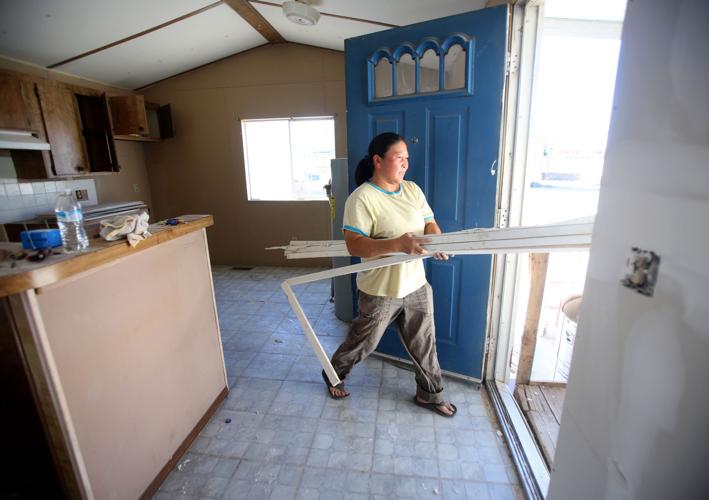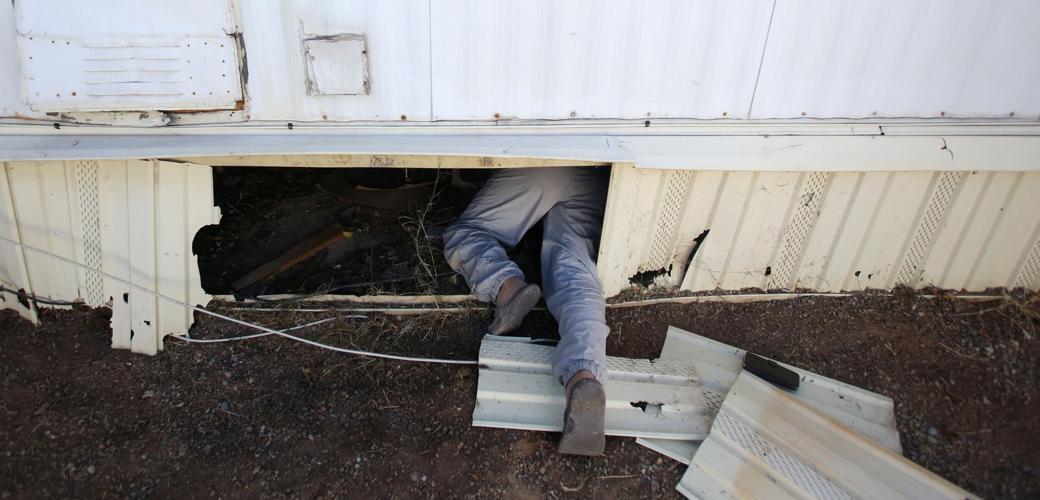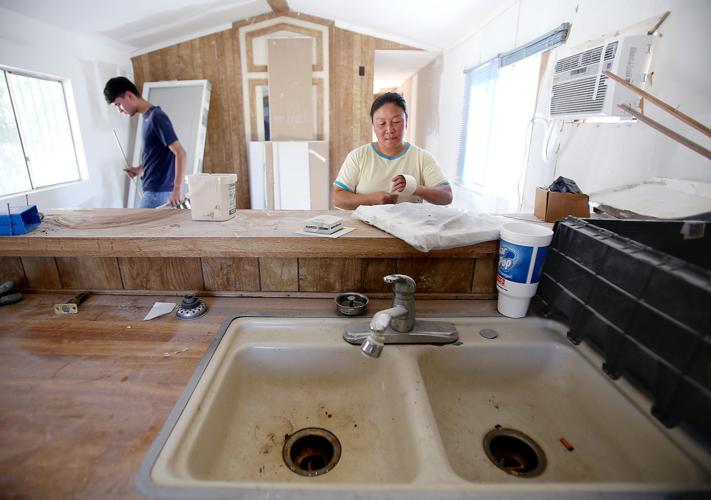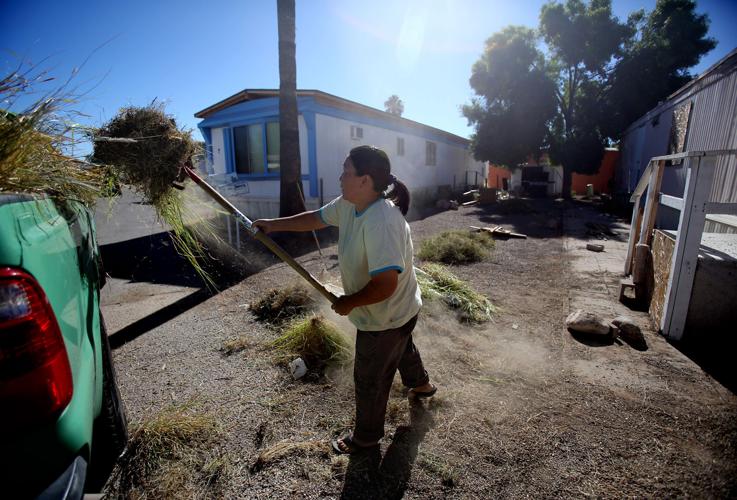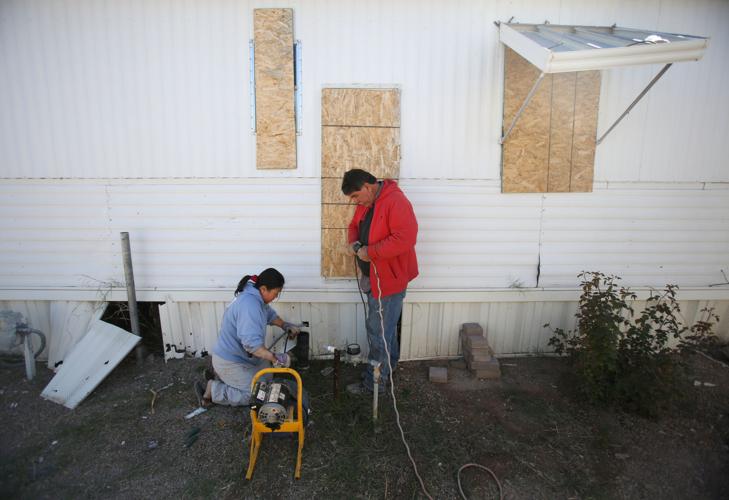Marylan Tran crouches next to a boarded-up trailer on a December afternoon, her hands moving quickly and confidently. Squatting in flip-flops, her bare toes and forearms streaked with mud, Tran wrangles with a leaky water pipe she dug up that morning amid the 50 trailers at Su Casa Mobile Home Park.
Smearing pungent blue glue over a piece of PVC, Tran replaces the section of pipe within minutes. A stinky clogged sewer line is next on her list, and Tran is smiling as she rapidly shovels dirt over exposed pipe at the south-side trailer park, which she bought last year at a foreclosure sale.
Tackling substandard housing with her own two hands has become a passion for Tran, 45, and Southern Arizona has plenty of it.
Since 2013, Tran has partnered with friends to buy four of the most degraded trailer parks she could find in Tucson and then set out to completely overhaul them: replacing old trailers that are beyond repair, upgrading the parks’ utility infrastructure, insulating trailer walls and installing brand-new appliances.
Her most recent trailer park purchase was Su Casa at 5353 S. Country Club Road. Dozens of trailers there are boarded up and under renovation.
In less than a year, Tran and her work crew replaced 27 trailer roofs at Su Casa. She’s also committed to keeping rents low enough that low-income tenants can afford to live there.
The work is so rewarding, it makes up for the exhaustion, financial stress and occasional bout of loneliness, said Tran, who moved here from Southern California and has no family in Tucson.
“I’m just so grateful,” she said. “I dream this is a community, with people able to have a good life together.”
The labor is a stark departure from Tran’s first job. As a young woman she spent 11 years as a nun, mostly at the Lovers of the Holy Cross convent in Los Angeles. But in her early 30s, she had to leave the convent to take care of her father when he was dying of cancer. Soon after she returned to her sisters, she had to leave again to care for her ailing mother.
As time passed, Tran said she realized how much good she could do outside the sisterhood, without any constraints on her independent streak.
“At the convent, you serve under obedience,” she said. “Here, you serve directly to God, you listen to whatever God is calling you to do through the people. You touch them and feel them every day. You need to make decisions all day long, by yourself. And I have to take care of myself, too. It’s a little bit tough, but I feel very free.”
A NEW MISSION
In 1990, when Tran was 18, she and most of her family moved to the U.S. from a remote mountain town in Vietnam.
After leaving the convent to care for her parents, Tran went to school for nursing, working her way up to becoming a registered nurse. She was earning money for the first time in her life, while still living the simple, ascetic life of a sister, she said.
“All of the sudden I had money,” she said. “I didn’t know what to do with it.”
She bought a home in Westminster, California, began teaching herself how to remodel it and then rented it out. She sold it for $600,000 in 2015.
With money to spare, Tran started thinking about how to give back. She’d heard Arizona had a plethora of distressed mobile home parks, where she thought she could make a difference on multiple fronts: improving the quality of the housing and counseling the residents.
After buying her first park in Tucson in 2013, she worked almost nonstop alongside her first partner, another former nun who recently decided to return to the sisterhood.
For 18 months every week they commuted between Tucson and San Diego, where Tran worked three, 12-hour nursing shifts between Thursday and Saturday. They left for Tucson each Sunday at 5 a.m. and were back to renovating trailers by 2 p.m. Tran said she put more than 100,000 miles on her nearly new Prius.
In late 2015, Tran quit nursing to focus on her mobile home parks.
“I had more tenants that needed more,” she said. “I don’t have people to go run errands. I am the one who checks everything is ready for the tenant, I am the one who will buy all the materials and I am the one who is handy. … I needed to be here.”
DANGEROUS CONDITIONS
Conditions were dire in the parks she bought. Neglected water leaks led to mold growth. Broken plumbing meant raw sewage piling up beneath the trailers. Shoddy electrical work led to fire hazards. Crime and drugs were rampant, as was despair among existing tenants.
“The conditions shocked me. How can people live like this? It looks like they have no choice,” she said.
Su Casa was in complete disrepair after the previous owner abandoned it last year, leaving tenants confused and without water until Pima County’s Community Services department stepped in to restore water service. Tenants moved out as squatters moved in, stripping anything valuable out of the abandoned trailers, Tran said.
Tran works alongside her maintenance crew, and her self-taught renovation skills run the gamut.
“I can do everything. I can do the roofing, tile, electrical, plumbing,” she said. “YouTube will teach me everything I don’t understand.”
Today, Tran said she has a waiting list of low-income tenants eager to move into Su Casa. Her park at 2901 N. Fairview Ave., has 16 occupied trailers and six others are still being renovated. At her property at 5755 S. Fontana Ave., all 17 trailers and RVs are now occupied.
At the Fontana park — the first she purchased — Tran disposed of the trailers that were beyond salvaging and brought in quality RVs. She’s also installed free Wi-Fi to help her younger tenants with their job searches and so her elderly tenants can stay in touch with family and friends through social media.
“My priority is to make the tenant have a good life,” she said. “They deserve it. It’s a loss (to provide Wi-Fi) but it’s a gain for the tenant.”
Two years ago, Sandra Miller, 66, moved to Fontana to be closer to her disabled son, who lives in the RV next door. After Miller told Tran about a crack in the linoleum kitchen floor, within a week Tran had re-tiled the entire thing, said Miller, a part-time in-home caregiver. Tran also installed a new air conditioner, toilet and refrigerator, Miller said.
“She really loves the people who live here, and she bends over backwards for us,” she said.
TURNOVER IN OWNERS
Tucson’s worst mobile home parks are downright dangerous, and the most vulnerable tenants there can be victims of exploitation, housing advocates say.
Aging and neglected trailer parks can be the last resort for low-income residents who either can’t afford another option or can’t find a landlord who will rent to them due to bad credit, a criminal history or an eviction on their record. Undocumented immigrants often choose trailer parks because some landlords don’t do background checks.
The threat of eviction can keep tenants quiet about deplorable housing conditions, and that fear allows the conditions to fester — and exploitation to thrive, said Jana Happel, attorney with Southern Arizona Legal Aid.
Another Tucson mobile home park owner said the economic recession helped weed out some of the most negligent or absentee landlords.
Jeff Landon owns 13 parks, including Kino Mobile Home Park next door to Su Casa.
“What I try to do is provide safe, cheap housing for low-income people. Looks like she (Tran) is trying to do the same,” said Landon, who also bid on Su Casa park during last year’s foreclosure sale. “I’m always happy whenever anybody improves any property — especially when it’s next door to mine.”
Landon said the sale of some of the most badly run parks after the recession has left an opening for owners like him and Tran to redevelop them.
“I think the better operators fared better and there was some shake out” after the recession, he said. “The people who were out-of-state owners and didn’t have strong management here, I think they suffered a lot of vacancies and those parks became a lot less profitable. Some of them changed hands because of that.”
“JOURNEY WITH THEM”
Tran makes a point to spend time with her tenants and her maintenance crew, sharing meals or hosting barbecues. She counsels tenants on their personal problems — unemployment or addiction struggles — blurring the lines between landlord, social worker and friend. She likes her tenants to see her on the roofs of trailers or crawling underneath them, looking for the source of a tell-tale sewage smell.
“You need to journey with them. You need to become one of them,” she said.
Sally Valenzuela and her fiancé rent a trailer at Tran’s park on Fairview Avenue. Valenzuela, 50, said it’s easy to like Tran, who lived at the park for a year while renovating it.
“I think of her as a really good friend,” she said. “I always tell her, ‘You need to stop working so much, Mary.’ It’s seven days a week.”
Valenzuela said Tran is compassionate as a landlord, too. When Valenzuela’s fiancé had a stroke in October, he had to take time off from his landscaping job. Since Valenzuela was laid off from her office manager position months earlier, they knew they’d have trouble making their rent, which is $385 plus utilities.
When they told Tran, “she said not to worry — she’d give us the time to catch up,’” Valenzuela said.
“A CURIOUS MIND”
Tran invests heavily in her mobile home parks, spending upwards of $10,000 on a trailer remodel.
“Marylan amazes me,” said James Guan, 31, Tran’s friend and business partner. When it came to home renovation, “she has a curious mind and she learned fast. And she understood if you do it on your own, you save money and put it back into the park.”
Tran, Guan and his wife, Therese — also a former nun from the L.A. convent — purchased a 1930s-era trailer park at 99 E. Palmdale St. in March. They rebuilt the park from the ground up, Guan said, replacing the unlivable trailers, redoing the plumbing and electrical infrastructure and adding plenty of security cameras.
“I was more profit-driven in the beginning. (Tran) saw it as a way to help the poor,” Guan said. Today, he sees the financial and moral benefits of being a responsive landlord.
“A lot of (park) owners want to squeeze every penny out of tenants and not do repairs,” he said. “We do it right the first time, even though it costs double or triple. You save money that way, and also your tenants are happier and stay longer.”
One of their tenants, Jenell Sweeney, broke into a huge smile when asked how the park had changed under the new owners.
“I’m getting goosebumps,” said Sweeney, 49. “I can’t believe the changes in the area.”
When Sweeney first moved in two years ago, she lived for three weeks with broken plumbing that resulted in human waste dropping from the toilet onto the ground below her trailer. Electrical problems meant her family had to rely on candles at night for lighting. Despite her pleas, the former park owners wouldn’t repair the sewage problem until a city code inspector threatened to condemn the trailer, she said.
She used to always keep her trailer door shut, fearing the squatters who were living in the park’s abandoned trailers. Prostitutes were always walking by and she worried about gun violence, said Sweeney, who lives with her boyfriend and his 12-year-old daughter.
Within 48 hours of buying the park, the new owners had visited every tenant and asked for a list of their problems, Sweeney said. Now, the abandoned trailers are gone. Park tenants held a Fourth of July barbecue this year. And Sweeney said she now feels safe relaxing on a couch outside of her trailer, with the door wide open.
“It’s nice to be that comfortable again,” she said. “Their first concern is the safety and happiness of their tenants, and it shows. They’re not slumlords.”
Tran recently visited her old convent in L.A. after her mother’s death in October. For the week she stayed there, she easily fell back into the routine of early-morning prayer time and a strictly regulated schedule. Back among her sisters, it felt like she’d never left, she said.
“I was into the groove. I do miss them a lot,” she said.
Tran often wonders when will be the right time to return to the sisterhood, but she said she can’t leave Tucson any time soon; her tenants are her new family, and there’s too much work to do.
“The need here is more than the convent,” she said. “My heart is here now.”


